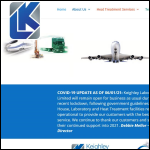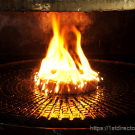- 60,000 contract/tender opportunities per year
- 4 Million UK Companies listed
- 12 million Director Names
- 100 million web pages indexed
Keighley Laboratories Ltd
Overview
- Mrs Debbie Mellor - Managing Director
- BLOWER, Keith - Director
- MELLOR, Debbie Jean - Director
- MELLOR, Matthew Robert - Director
- WRIGHT, David - Director
Products
Keighley Laboratories Ltd specialise in the analysis, testing and heat treatment of metals. We offer a range of metallurgical laboratory services for clients across all engineering sectors, including the marine, aerospace, defence, rail, oil and gas industries. The company has become renowned for its ability to take on contracts of any size and duration whilst ensuring a professional service from start to finish.
As a company that works across some of the most demanding industry sectors, we are relied upon to deliver technical excellence in all areas of sub-contract heat treatment and metallurgical laboratory services. Only a company with considerable resources and experience across multiple sectors can deliver the kind of service that’s demanded by our industry partners. Established in 1920, Keighley Laboratories has both the experience and the resources to meet and exceed those demands.
Our extensive facilities allow us to perform a wide variety of heat treatment and metal analysis tasks – with all procedures carried out by people who really understand and care about metallurgy. To ensure that we’re able to provide the same high level of service for many years to come, Keighley Laboratories Ltd has initiated a policy of continual investment in its people, plant and equipment.
Our team of metallurgy experts have an absolute commitment to quality which ensures customer satisfaction every time, and we can of course provide nationally and internationally recognised quality assurance certification and approvals as required.
The ability to recognise your needs allows us to offer practical advice, guidance and innovative solutions to your problems, and our wealth of application experience ensures that the challenges associated with design, development, manufacturing, processing and testing can all be overcome.
Tell us about the challenges you’re facing and we’ll help you find a solution. Call our experts today on 01535 664211.
More information on our heat treatment and metal analysis services can be found in the sections below and on our website.
Induction Hardening
Induction hardening involves rapidly heating and quenching components using high frequency electric fields. The process is automated with programmable, computer-controlled machines which ensure reliable and consistent hardness levels across the component. It is often used in the production of inductors and coils, shafts/pins and gears.At Keighley Laboratories Ltd we offer subcontract hardening of shafts, gears and internal bores, as well as complete in-house manufacture of inductors. (We have hundreds of hardened components available from stock, but can also design and manufacture according to your requirements). Typical carbon and alloy steels processed include 080M40, 070M55, 526M60, 708M40, 817M40 and 534A99.
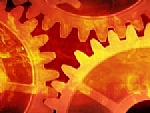
Carburizing/Case Hardening
Carburizing is a case hardening operation which gives components a hard, wear-resistant shell and a soft but tough core. It is carried out in pit or sealed quench furnaces where temperatures are controlled between 800°C and 960°C to achieve case depths from 0.1 to 5.0mm. Programmable Logic Controls (PLCs) and oxygen probes ensure that the temperature and atmosphere cycle time are controlled accurately. Components are typically quenched in oil, though molten salt quenching is available to minimise distortion. Ovality and flatness may be controlled by Gleason press quenching. Types of material often treated in this way include 080M15, 665M17, 832M13, AISI 1020, 8620 and 17 NiCrMo6 "type" steels.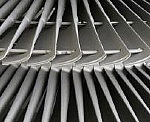
Carbonitriding
This is a similar process to carburizing (above) – the effect is a change in the composition of the metal’s surface. In this case, carbon and nitrogen are diffused, generally producing a much shallower case depth upon hardening than a carburized component (although this remains supported by the ductile “core” material). Components up to 0.6m in diameter and up to 1.2m long can be treated vertically using special jigging – this minimises component distortion. To find out more about carbonitriding and the benefits it brings, please visit Keighley Laboratories online or get in touch on 01535 664211.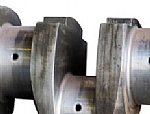
Press Quenching
Press quenching is a process typically carried out after carburizing on thin or complex parts such as gears or cams which tend to distort excessively when quenched in oil. The components are re-heated after cooling from the carburizing process and then oil-quenched on a press using specially designed tooling which holds them to shape. The maximum part diameter we are able to press quench is 0.6m, and the maximum height is 0.25m.
Statistical process control is available for the press quenching process if required.

Stress Relieving
Stress relieving is a technique employed to remove internal residual stresses which have been generated by prior manufacturing processes such as casting, machining, cold work and welding. It is carried out so as not to produce changes in material structures or mechanical properties. Components that have not undergone the stress relieving process are liable to distortion, cracking and associated service problems. The process can be applied to both ferrous and non-ferrous alloys, as well as to some non-metallic materials such as plastics.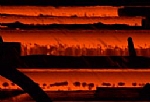
Precipitation Hardening
This process is applied to special precipitation hardening alloys where low distortion during heat treatment is required. Components are often finish machined in their soft, solution-treated state and then heated at a specific (relatively low) temperature for a fixed time to give the required hardness and mechanical properties. To find out more about precipitation hardening and its benefits, visit Keighley Laboratories online or contact us on 01535 664211.
Austempering - ADI
Austempered Ductile Iron (ADI) is a material produced through the application of a unique heat treatment process which involves high temperature homogenisation of the components followed by isothermal quenching into molten salt baths at elevated temperatures. Austemper treated irons offer superior strength, ductility, toughness and wear resistance – not just in comparison to ductile irons, but also cast and forged aluminiums and many cast and forged steels. They also offer excellent damping capacity (up to five times that of steel). Find out more about Austempered Ductile Iron and the advantages it holds over conventional ductile irons by visiting Keighley Laboratories online.
Martempering
Martempering is essentially a combined hardening and tempering process that keeps distortion to a minimum and reduces the likelihood of a component cracking under stress. It results in properties which combine good wear resistance, high strength, ductility and toughness. To find out more, please head over to the Keighley Laboratories website or get in touch on 01535 664211.
Hardening and Tempering
Hardening and tempering is a process employed to give commercial steels the optimum combination of strength, hardness and toughness. Firstly, the material is heated to a temperature in excess of 780°C and then cooled quickly in order to harden it. The component may be quenched in oil or molten salt (which helps to minimise distortion). Once this is complete, the material undergoes uniform tempering to reduce the hardness but increase the toughness – this is done using electric air circulating pit furnaces. Hardening and tempering is predominantly carried out on medium carbon, alloy or tool and die steels such as 080M40, 817M40, 709M40, O1, D2 and D3.
Annealing
Some forming operations can make components highly stressed and excessively hard. In these cases, softening operations such as annealing may be carried out. The chief reason to anneal a material is to reduce its hardness for subsequent machining. The process can be carried out at a variety of temperatures - a controlled temperature and controlled or slow cooling is also often necessary to ensure the material’s structure is as desired.
All metallic materials can be successfully annealed - ferrous and non-ferrous. When applied to steels and nodular irons, annealing will increase ductility and provide a controlled microstructure. The process can also be applied to iron castings which exhibit chill.

Normalizing
Joining, forming, casting and machining operations can all create stresses within the subject material. Normalizing is one of the ways of stabilising these stresses. It is used to refine a metal’s microstructure, especially in steels which will require further processing (carburizing, for example), and it is capable of softening and hardening as well as stress relieving, depending on the material’s initial state and chemical composition.
Normalizing is often applied to components which require specific mechanical strength properties. The process helps to ensure future dimensional stability. It is usually carried out on ferrous materials such as steels and irons.
Find out more by visiting Keighley Laboratories online.

Tufftride® - Ferritic Nitrocarburizing
Tufftride® nitrocarburizing is a salt bath process used to improve component quality by retarding wear, increasing fatigue strength, resisting corrosion, increasing hardness, enhancing appearance and achieving specific properties. It is carried out at temperatures ranging between 580°C and 610°C, with treatment times from 30 minutes to 3 hours. In some cases, salt bath nitrocarburizing may be used as an alternative to other surface zone processes such as hard chromium plating or case hardening, with equal or improved effectiveness and greater economy. The process is most commonly applied to steel, sintered iron and cast iron components.
Chemical Analysis
Keighley Laboratories Ltd is able to carry out chemical analysis on a wide range of materials (mainly metal or metal-related) using a variety of different analysis techniques. The most commonly tested materials include iron, steel, stainless steel, aluminium alloys, nickel alloys and foundry products. Techniques used include:
- Glow Discharge Spectroscopy.
- Atomic Absorption Spectroscopy.
- Inductively Coupled Plasma Optical Emission Spectroscopy.
- Elemental analysis for carbon, sulphur, nitrogen and oxygen.
- Classical Gravimetric and Volumetric “Wet” methods.
- Qualitative Depth Profile Analysis to identify material coatings, metallurgical treatments etc.
- Cleanliness checks.
The wide range of materials we test and the multiple techniques we employ makes it difficult for us to give specific turnaround times and prices. We prefer instead to quote each enquiry on an individual basis. Get in touch with your requirements and we’ll get back to you as quickly as possible.

Mechanical Testing
A key function of the Test House at Keighley Laboratories is to test materials and components in order to establish their mechanical properties and structures. This can be done in a variety of ways:
- Impact Testing – This is used to measure the toughness/brittleness of a material and its capacity to resist mechanical shock. Materials can be tested to European and American standards.
- Hardness Testing – The hardness of a material is determined by its resistance to indentation from a hardened steel/tungsten ball or diamond indentor.
- Metallography – A process that allows a metallurgist to determine certain characteristics, including grain structure, case depth, quality of heat treatment, weld quality and coating or plating thickness.
- Tensile and Compression Load Testing – This involves putting a test piece of known cross-section under tension or compression until either a proof load is achieved or failure occurs. Tests can be undertaken at ambient, sub-ambient and elevated temperatures ranging from -100°C to +750°C.

Problem & Failure Investigation
Our metallurgists can also undertake reverse engineering and investigation work in order to determine the cause of material/component failure. Investigations into corrosion, wear, machinability, coating, fabrication and heat treatment problems are all carried out on a regular basis.
Specialist consultancy services include:
- Failure/Fracture investigations
- Reverse engineering examinations
- Foundry consultancy
- Insurance claim examinations
- Expert witness arbitration
- Forensic type investigations
- On-site examinations as required
Our metallurgists, chemists, engineers and technicians have a wealth of combined experience which covers a broad range of materials, treatments and product types within many different industries.

Metallography & Product Testing
Keighley Laboratories has a full metallographic facility equipped with projectors, stereo binocular microscopes, video printers and other associated equipment. We offer standard and bespoke testing to customer requirements, and can develop non-standard test facilities for special projects. For more information, please visit Keighley Laboratories online or get in touch on 01535 664211.
Positive Material Identification/Alloy Verification (PMI/AV)
The latest, state-of-the-art equipment allows us to identify most ferrous and non-ferrous materials. Being handheld, our equipment can be used to perform XRF (X-ray fluorescence) and Spark Emission procedures both in-house and on-site. (XRF equipment utilises the latest miniature X-ray tube technology to ensure safe on-site usage and is operated by fully trained and competent technicians). PMI/AV is undertaken on a wide variety of components, including valves, fasteners, fabrications, pipework, castings and forgings. More information on this service can be found on the Keighley Laboratories website.
Weld Testing
We are able to carry out weld procedure and welder qualification approval tests to European, American and most International standards, including specialised Aerospace and Defence related standards. We can also offer on-site weld invigilation and provide full documentation as required.
UKAS accredited testing and certification can be carried out to many standards and specifications, including:
- BS EN, ASME and other commercial standards
- CAA (various), BAE Systems (various), Rolls Royce (RPS 912), Westland Helicopters (WHP5 455) and other aerospace standards.

Non Destructive Testing (NDT)
Keighley Laboratories Ltd are able to carry out various Non-Destructive Testing (NDT) procedures, including:
- Penetrant Testing (PT) – Used for the detection of surface breaking discontinuities on magnetic and non-magnetic materials, including glass, ceramics and plastic.
- Magnetic Particle Inspection (MT) – Used for the detection of surface breaking and slightly sub-surface (up to 2mm) discontinuities.
- Ultrasonic Flaw Detection (UT) – Used for the detection of volumetric discontinuities in welds, wrought iron products and castings. Can also be used to perform thickness and depth checks. Tests are carried out to various standards.
- Relative Magnetic Permeability – Used to test a material’s ability to become magnetized.
- Non Destructive Ferrite Determination – Used to determine the ferrite content of both austenitic and duplex stainless steels.

Image Capture
Advanced image capture and analysis technologies enable us to capture digital images that demonstrate linear measurements with certainty, give insight into grain size, phase counts and coating/plating thickness, and which provide a quick and accurate evaluation of the material’s microstructures. To find out more about our image capture and analysis services, please visit us online or get in touch directly on 01535 664211.
Fatigue Testing
Facilities are also in place for specimen and component fatigue testing up to 150kN at ambient temperatures. Operating frequency range is 60-180Hz, dependant on the stiffness of the specimen being tested (resonant frequency). Digital equipment allows us to closely control and monitor functions.
For more information about this service, please get in touch on 01535 664211.

Corrosion and Related Testing
Keighley Laboratories are able to employ a variety of corrosion-resistance testing techniques, including:
- Neutral Salt Spray (NSS)
- Acetic Acid Accelerated Salt Spray (AASS)
- Copper Acetic Acid Accelerated Salt Spray (CASS)
Typical specifications include ASTM B117 (NSS), ASTM B368 (CASS), ISO9227 (NSS, AASS and CASS). We can also perform Fog/Dry Cyclic Salt Spray Tests and 100% humidity tests.

Details
Info
| Registration Number: | 00164811 |
| VAT Number: | GB500 3496 84 |
| Registered at Companies House: | 4 March, 1920 (104 years and 1 month ago) |
| No of Employees: | n/a |
| Annual Turnover: | n/a |
| Importers: | |
| Exporters: |
Opening Times
| Monday | 09:00 AM - 05:30 PM |
| Tuesday | 09:00 AM - 05:30 PM |
| Wednesday | 09:00 AM - 05:30 PM |
| Thursday | 09:00 AM - 05:30 PM |
| Friday | 09:00 AM - 05:30 PM |
| Saturday | Closed |
| Sunday | Closed |
Questions
Additional Information
Gallery
Financial Information
To view more detailed financial information for this company click here.
- MEDIEN PRESSE VERTRIEBS LTD
- The Rooflight Company Ltd
- A Gildersleve Ltd
- Decorative Bows
- DC, DC Converter Heatsinks
- Car Dealer
- Fire Deluge System
- SOUTHAMPTON
- P. Hunt Ltd
- CHANDLERS CONSULTANCY Ltd
- RMK BUILDING & CIVIL ENGINEERING SERVICES Ltd
- Quality Control Inspection Services
- Sky Traffic Ltd
- Slj Projects Ltd
- Hcbb Processing Services Ltd
- Stainless Steel Stockholders
- Sunset Pharmacy LLC
- The Old Mill House Freehold Company Ltd
- THE BARBER CHAIR LTD



